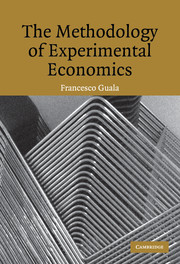Book contents
- Frontmatter
- Contents
- Analytical Table of Contents
- Acknowledgments
- 1 Introduction
- PART ONE INFERENCES WITHIN THE EXPERIMENT
- 2 Inside the Laboratory
- 3 Hypothesis Testing
- 4 Causation and Experimental Control
- 5 Prediction
- 6 Elimination
- PART TWO INFERENCES FROM THE EXPERIMENT
- Appendix A
- Appendix B
- Bibliography
- Index
2 - Inside the Laboratory
Published online by Cambridge University Press: 10 December 2009
- Frontmatter
- Contents
- Analytical Table of Contents
- Acknowledgments
- 1 Introduction
- PART ONE INFERENCES WITHIN THE EXPERIMENT
- 2 Inside the Laboratory
- 3 Hypothesis Testing
- 4 Causation and Experimental Control
- 5 Prediction
- 6 Elimination
- PART TWO INFERENCES FROM THE EXPERIMENT
- Appendix A
- Appendix B
- Bibliography
- Index
Summary
Before we get into the heart of the matter, it is worth putting on the table an example of experimental research in economics. I shall focus on an experiment that I know very well, because I was personally involved in it. Because the experiment as a whole is too complicated to be fully described here, I'll just focus on part of it. The part I shall look at is a typical example of a replication. Replicating someone else's results is not the sort of thing that will win you a Nobel Prize in economics. Fame and prestige derive from revolutionary results that affect the direction of research in the discipline. However, replications are not without importance and in fact constitute a large part of everyday work in experimental science.
Replications
A common reaction, when people first hear about experimental economics, is to say that of course people are not the sort of thing you can experiment with. Behind this reaction lies the thought that human beings are quite different from, say, atoms or molecules: they possess that elusive capacity that philosophers call “free will.” So, the argument goes, their behavior does not obey laws, as does the behavior of physical entities. What's the point of experimenting then?
This argument takes several sophisticated forms in the social science literature, and even a cursory discussion would take away more space than required for my purposes. But the above worries can be easily dismissed: as any experimenter knows, human behavior is highly predictable.
- Type
- Chapter
- Information
- The Methodology of Experimental Economics , pp. 13 - 38Publisher: Cambridge University PressPrint publication year: 2005



